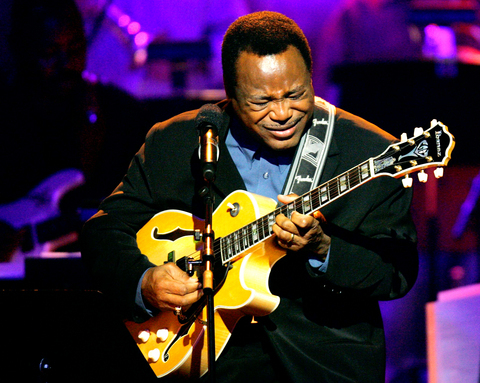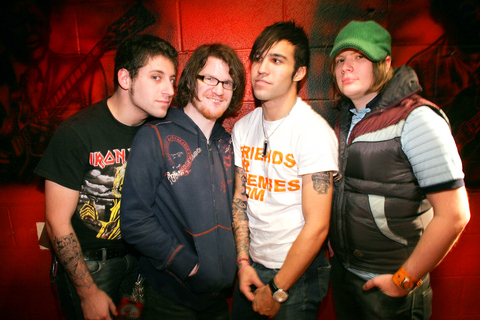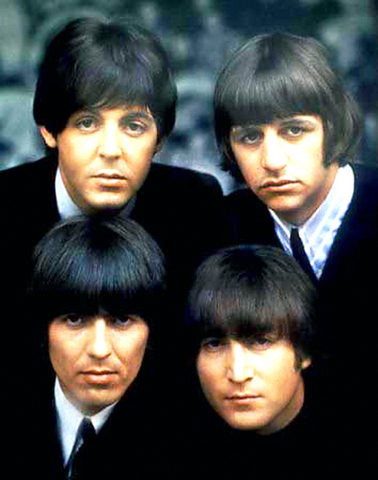It is hard to pinpoint when things began to go wrong between the major record labels and the music-buying public. All anyone can say with any certainty is that the fun went out of the relationship a while ago. Maybe it was the record industry's sour-faced approach to illegal file-sharing and downloading. Or perhaps it was the deadening routine of overhype. Either way, it was hardly surprising when the fans began to seek excitement elsewhere.
This has been the year fans have increasingly taken music into their own hands, rejecting the overprocessed diet served up by many major labels in favor of something a little more homemade. In the process they have notched up numerous high-profile successes, including Arctic Monkeys, Arcade Fire, Clap Your Hands Say Yeah, Spinto Band and Nizlopi.
Enabled largely by the Internet, bands have been able to record and promote their own music, and fans to revel in it and pass it on -- without the aid of major label backing, stylist and towering billboard advertisements. Furthermore, fans are finding it ever easier to interact directly with their favorite bands, rather than seek nourishment from the insubstantial publicist-approved quotes given in interviews. The result, of course, is that the charts have become imbued with a rather joyous and friendly anarchy.

PHOTOS: AGENCIES
Arguably, it was the Libertines who set the pace; the baton then passed to Babyshambles and imminently to Carl Barat's new band, Dirty Pretty Things. Characteristically, Libertines gigs (and those of their circle) eschewed the over-priced ticketing, over-priced ale gig-going conventions that had become standard in the Clear Channel era, and instead guerrilla gigs were played ad-hoc in bizarre venues, such as rooftops, farms and the London underground. Fans were informed of the "venue" hours before in a flurry of e-mails, Web site postings and text messages, and would travel from all over the country to congregate at the elected hour and see their favorite band play centimeters from them (and probably go to the pub with them afterwards). Pete Doherty allowed fans to bed down in his flat if they missed the last train home.
The Libertines' and Babyshambles' sprawling international fanbase was largely united by the Internet, on forums such as Conversations in Arcady, and Web sites www.babyshambles.net and Spirit of Albion. The most intimate of the sites, however, is www.balachadha.com. Launched in August, and created with his friend and literary agent, Paul Roundhill, Bala Chadha is intended to be a living biography of Doherty, as well as a method of reducing the gulf between himself and his fans.
Getting in on the act

Bala Chadha's moderator is Texas Bob, who moved to London in 1996, having heard of Camden's most infamous pub, then the hub of Britpop.
"I got a one-way ticket here so I could go to the Good Mixer," he explains. Bob, 37, works in the post room of a mail-order company by day and spends his free time videotaping his favorite bands. He met Babyshambles through mutual friends the Paddingtons and was instantly smitten. "In my lifetime, I've never known a band break down the wall between the band and the fans like Babyshambles."
In another example of rapidly augmenting fan power, this year's Christmas number one contender in Britain is a largely unheard-of band, Nizlopi, singing about driving a JCB. Quite how a formerly niche band could floor the sleigh-belled, gospel-powered might of the major label yuletide offerings is a lesson in humility, hard graft -- and the power of the circulated MP3.

Nizlopi's fortunes changed almost two months ago, when the Daily Star mentioned the JCB Song three times in a week as a potential candidate for the Christmas number-one spot. At the time, the band had odds of 33-1. But then the strangest thing happened -- across the country fans began placing bets on Nizlopi -- not just trifling sums, but big, bold US$69 bets. The odds tumbled and within a week they stood at 14-1.
Word of mouth -- and its hi-tech equivalent, the Web site link, plays a large part in fan power.
As Texas Bob said: "The record companies didn't count on bands banding together, helping one another out."

Indeed it was via the Trap2 Web site that Steve McInerney stumbled across another band from the city of Sheffield in northern England, the Arctic Monkeys, and so changed his life in ways previously unimaginable to the 20-year-old record-shop worker from Manchester.
"People sent me their MP3s," he recalls, "I remember downloading their I Bet You Look Good on the Dancefloor, and the lines made me laugh out loud. I told all my friends at uni about them. I was smiling all the time." McInerney now moderates on the Arctic Monkeys' Web site. "But we have another chatroom, about 300 people, most who meet up for gigs and stuff."
McInerney believes Arctic Monkeys fans are in a class of their own, and it is this that will ensure the band's ongoing success.

"I've never met fans who talk about their band so much," he said. "There's dedication. Turning up to gigs and everyone knows the words to all the songs. I know fans who drive up and down the country going to every gig on the tour. A fan from the US came over from San Francisco. We'll always stick by them, we'll always buy their singles."
Perhaps the most heartwarming tale of Arctic Monkeys fandom involves the sharing of the band's demos online. "There's a guy called Sherrif who sent me the MP3s, 15 demos," explained McInerney. "He hosted this infamous link -- I can still remember the link off by heart 'cause I forwarded it to so many people. He got fined a grand [£1,000] for excessive bandwidth 'cos he sent so many links, and all the fans clubbed together to pay him back and clear his debt."
But the major labels say they aren't quaking in their boots just yet. The events of the past 12 months have simply expedited the shift in the way they operate in A&R, marketing, and new media.

"Has this changed our job? Not at all," said Luke Bevans, new media manager for Universal Music/Mercury Records. "I think the Arctic Monkeys phenomenon is a red herring, it happened because it was a great song and it connected with people ... people swap music, and send each other files. I believe in free downloads -- we've been offering them for over 18 months as samples for new acts." He cited as an example a new "singles club" for a new act, Boy Kill Boy: "Every two weeks for six months people can log in and get a free download. But they are just the equivalent of what used to be cover-mounts."
The difference, perhaps, is essentially where and how people are now finding out about new music. "It just proved that having a strong online marketing campaign worked," argued Bevans, "rather than just being something we should be involved with."
There have been other changes too, of course: "In terms of what the A&R department does, I would say yes, sites like myspace are a good way to look for new music, to listen to it before you see it live, and to find out what people are enjoying, what groups are listening to. For record companies to ignore that would be stupid."

Dedicated followers of music
For some bands it is not just about the Internet -- Wakefield upstarts the Cribs have secured a dedicated following by touring their hearts out. Signed to Wichita in 2003, they did not have the budget for advertising or videos and so played as many gigs as possible to get themselves known, often just for beer. It was a wily tactic: a fantastic live band, the Cribs swiftly found themselves an enviable reputation.
"When (the single) Scenesters came out, if the charts were just on downloads we would have gone in at number 13," said Ryan Jarman, their singer and guitarist. "In the end we went in at 25."
It was still a triumphant moment for the Cribs and he believes, two fingers to the labels' way of operating.
"It showed it wasn't about adverts," he said. "Labels think you throw enough mud and some'll stick. But having a hardcore fanbase is worth far more than a backpage ad on the NME."
"We've had people flying over from Japan (and back on the same night)," said Jarman with disbelief. "I never buy clothes and so we have fans who bring me T-shirts. They nick them too, but I think easy come, easy go."
And the band are happy to mingle with their T-shirt-snaffling devotees. "I love hanging out with people after gigs, that's part of it," Jarman said.
And maybe this is part of it. Weary of stadium rockers with their "let them eat cake" and "where are the groupies?" attitudes who have populated music over the past three decades, fans are pushing their own heroes.

“Why does Taiwan identity decline?”a group of researchers lead by University of Nevada political scientist Austin Wang (王宏恩) asked in a recent paper. After all, it is not difficult to explain the rise in Taiwanese identity after the early 1990s. But no model predicted its decline during the 2016-2018 period, they say. After testing various alternative explanations, Wang et al argue that the fall-off in Taiwanese identity during that period is related to voter hedging based on the performance of the Democratic Progressive Party (DPP). Since the DPP is perceived as the guardian of Taiwan identity, when it performs well,

The Taiwan People’s Party (TPP) on May 18 held a rally in Taichung to mark the anniversary of President William Lai’s (賴清德) inauguration on May 20. The title of the rally could be loosely translated to “May 18 recall fraudulent goods” (518退貨ㄌㄨㄚˋ!). Unlike in English, where the terms are the same, “recall” (退貨) in this context refers to product recalls due to damaged, defective or fraudulent merchandise, not the political recalls (罷免) currently dominating the headlines. I attended the rally to determine if the impression was correct that the TPP under party Chairman Huang Kuo-Chang (黃國昌) had little of a

At Computex 2025, Nvidia CEO Jensen Huang (黃仁勳) urged the government to subsidize AI. “All schools in Taiwan must integrate AI into their curricula,” he declared. A few months earlier, he said, “If I were a student today, I’d immediately start using tools like ChatGPT, Gemini Pro and Grok to learn, write and accelerate my thinking.” Huang sees the AI-bullet train leaving the station. And as one of its drivers, he’s worried about youth not getting on board — bad for their careers, and bad for his workforce. As a semiconductor supply-chain powerhouse and AI hub wannabe, Taiwan is seeing

Jade Mountain (玉山) — Taiwan’s highest peak — is the ultimate goal for those attempting a through-hike of the Mountains to Sea National Greenway (山海圳國家綠道), and that’s precisely where we’re headed in this final installment of a quartet of articles covering the Greenway. Picking up the trail at the Tsou tribal villages of Dabang and Tefuye, it’s worth stocking up on provisions before setting off, since — aside from the scant offerings available on the mountain’s Dongpu Lodge (東埔山莊) and Paiyun Lodge’s (排雲山莊) meal service — there’s nowhere to get food from here on out. TEFUYE HISTORIC TRAIL The journey recommences with